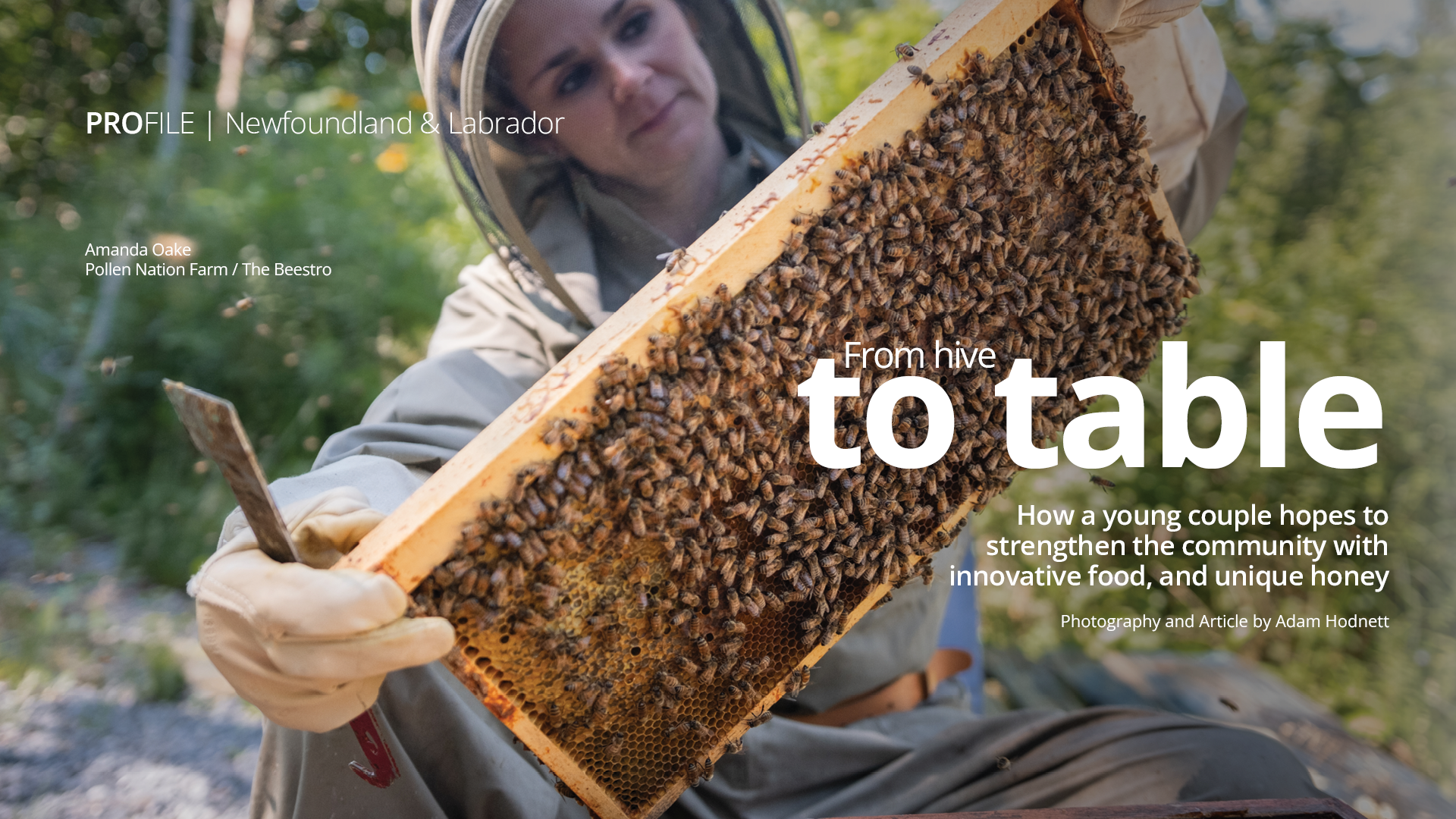

With a full body suit and face mask, and a smoking canister at her side, Amanda Oake steps out the backdoor of her Cafe and The Beestro, and walks down the dirt path, to the boxes of honeybees behind an electric fence.
Constant streams of bees move in and out, as Amanda opens the crate, and pulls out honeycomb-covered panels that drip with raw honey.
Occasionally, drone bees meet us face to face. They are trying to figure out if we are a danger to the hive or not. Amanda is calm, gentle, and deliberate, as she pries the wooden frames from the boxes, to expose the inner workings of the hive. She is looking for the queens, to make sure they are thriving.
These bees spend the summer gathering pollen and creating a unique blend of flavours directly from the forest. The hives are only harvested once a year, to preserve this distinct flavour profile and to be used and sold as raw, unpasteurized, antibiotic-free honey.
At the same time, these bees are serving a foundational function for the forest. They directly allow the neighbouring plants to flourish. Just like the honeybees, Amanda and Nathan intend for their business, Pollen Nation Farm, to act the same way for their surrounding communities.
“Nobody is going to come to Newfoundland for one good restaurant,” Amanda said. “They’re going to come for a plethora. They are going to have a food experience. They are going to come and be able to learn about bees in the process. And if we’re successful, other people will be successful.”
Pollen Nation started by wanting to make use of Nathan Hornidge’s experience as a Red Seal chef, working around the country and Amanda’s growing interest in honeybees, her background in biology, and her love for the area she grew up in.
“Our whole vision was to take Nathan’s skill set, his culinary skill set, and we wanted to create this sense of community in the valley and bring people together in different ways,” Amanda said.
One big example of the couple’ approach is the creation of their summer festival, “A Bee Collab,” or “A.B.C.” The festival is several days of food, music, art, and education from the Humber valley.
“What we’re trying to do is integrate into the community more and bring educational elements and new products and new ways of approaching food,” Nathan said. “It’s our mission to bring some of that to the public, bring more awareness, and at the same time involve the bees as much as we can.”
Newfoundland-Labrador honeybees are unique in the world. The province is one of only two places where there aren’t varroa mites. These mites are considered one of the most damaging honeybee pests and can cause entire colonies to collapse.
But parasites are not the only danger lurking for honeybees.
“Last year, the owls and the foxes, I haven’t seen any sign of them, and I think the shrews kind of went unchecked,” Amanda said. “We got some of those in the hives.”
The rodents chewed into the wooden boxes and destroyed a large portion of the hives.
“We cried a lot,” Amanda said. “It is a hard job and it’s hot and it’s backbreaking and it’s all those things. And then just to see it all disappear, it was devastating.”
Amanda believes the disaster set their business plan back by 5 years. It was not just a matter of losing a year’s worth of product. It meant needing to establish new hives. They would need to buy nucleus colonies to even begin fixing the damage.
As soon as Amanda realized the extent of the damage, she called the CBDC Humber office. CBDC had helped them start their business in the first place. They had already been surprised by the level of support and understanding for their idea when they were nervous about involving other people who might not share their vision.
“There was a level of trust which I didn’t expect to find in a financial institution or organization,” Amanda said.
But Amanda was still nervous. She did not know if they would still be so understanding about changes to the plans, now that all the papers had been signed, and the business had been operational for some time.
“I reached out to Marvella right away and she came up, we had a chat and she said, ‘look, we’re going to get through this,’” Amanda said. “I felt like there was a level of trust and sympathy and empathy and support.”
Amanda now does not know why she ever hesitated to call.
“The familiarity and the kind of relationship that was easily built with the CBDC has been one that’s very comforting,” Nathan said, “They go to bat for us.”
Setbacks and sudden changes are just the reality for business owners. And for Amanda and Nathan, they also serve as a reminder for why they finally decided to jump into their business in the first place. When Amanda was deciding whether to leave the stability of her nursing job to pursue her dream, in the middle of the COVID-19 pandemic, she had a realization.
“Everything could go sideways really quick,” she said. “So, why am I wasting my time doing something that’s not meant for me?”
“The familiarity and the kind of relationship that was easily built with the CBDC has been one that’s very comforting ... They go to bat for us.”
NATHAN HORNIDGE
POLLEN NATION FARM


Ambitions is a publication of the Atlantic Association of CBDCs intended to promote and celebrate small business and entrepreneurial success in the communities we serve.
We let our clients tell our story.
Quick Links
Get In Touch
Atlantic Association of CBDCs
459 Murray St., Suite 200
Mulgrave, NS B0E 2G0
- Email: helen.michel@cbdc.ca
- Phone: 902.747.2232 Ext. 205
- Hours: Mon-Fri 8:30AM - 4:30PM
© 2025 All Rights Reserved.
